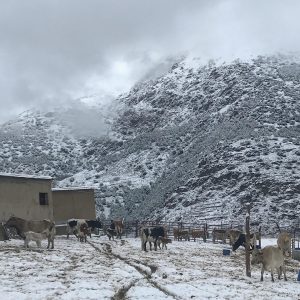Más allá de lo superficial

Trevélez
Habiendo estado en Granada durante casi 6 meses, estoy empezando a darme cuenta y a notar ciertos aspectos de la ciudad que están por debajo de la superficie. Por supuesto, vivir aquí como un lugareño tiene su belleza y me ha proporcionado un lado nuevo e integral de mi identidad social. Sin embargo, he notado que, como región, Andalucía se enorgullece de manera superficial de su herencia e identidad árabe gracias a sus principales atracciones turísticas, sin embargo, en el micro-nivel de la interacción social esto no es así.
Después de terminar los exámenes a principios de este mes tuve un fin de semana libre, así que decidí ir a los pueblos de las Alpujarras una vez más. Mi amigo y yo cogimos el autobús hasta el pueblo más alto de la montaña llamado Trevélez, donde estaba nevando; nos lo pasamos muy bien caminando por el campo nevado y comiendo los platos locales. Después de este viaje frío, volvimos a Granada y al día siguiente fuimos a un hammam. Esos son los baños árabes que dejaron los moros durante la conquista morisca y son muy populares en toda Andalucía como atracción. El hammam se llenó con varias piscinas de diferente temperatura, una sauna y una serie de camas donde se dan masajes. Definitivamente se necesitaba un viaje al spa después del estrés de los exámenes y me fui sintiéndome como una persona nueva.
Sin embargo, después de experiencias como esta, a menudo pienso en la cantidad de ingresos por turismo que Andalucía debe

El hammam – no se puede sacar fotos del interior
recibir por sus restantes tesoros islámicos dejados por la dinastía nazarí. A menudo se encuentra que las guías turísticas de Andalucía están llenas de información sobre sus grandes monumentos moros, como el Palacio de la Alhambra y la Mezquita de Córdoba. Aún así, me he preguntado si Andalucía está realmente orgullosa de su herencia árabe a un nivel más social y político. Este es un tema muy amplio para explorar, sin embargo, un evento que podría resumir brevemente o concluir una parte de este debate ocurre aquí en Granada anualmente el 2 de enero. Este evento se llama la Toma de Granada y celebra el aniversario de la conquista de Granada, y el último bastión de la España Islámica, en 1492 por los Reyes Católicos, Isabel I de Castilla y Fernando II de Aragón. La fiesta cívica y religiosa está rodeada constantemente de mucha controversia: algunos utilizan el evento como punto de encuentro de perspectivas políticas nacionalistas, extremistas y de extrema derecha, mientras que otros intentan poner fin a esta ideología y mostrar solidaridad con la comunidad musulmana de Granada. En el acto intervienen a menudo personalidades de la extrema derecha, como Javier Ortega Smith, secretario general de Vox, que el año pasado, en 2019, defendió la expulsión de la comunidad musulmana de Granada, tal como lo hicieron los Reyes Católicos en 1492, y también ensalzó el concepto de “Reconquista”, un término controvertido ya que niega esencialmente el poder del reino islámico y, como escribe el filósofo Ortega y Gasset, una reconquista que dura ocho siglos no es una reconquista.
El debate es enorme y está lleno de muchos entresijos, pero sin embargo es esencial mirar más allá de lo superficial; especialmente más allá de una España feliz y soleada donde la gente es amable y la cerveza es barata.
Beyond the Superficial
Having been in Granada for almost 6 months now, I’m starting to realise and notice certain aspects of the city that are below the superficial. Of course, living as a local here has its beauty and has provided me with a newfound and integral side to my social identity. However, I’ve noticed that, as a region, Andalucía superficially prides itself on its Arabic heritage and identity thanks to its main tourist attractions, yet on the microlevel of social interaction this is not the case.

Vacas en la nieve (Trevélez)
After finishing exams earlier this month I had a free weekend and so I decided to go to the Alpujarras villages once more. My friend and I got the bus to the highest village up the mountain called Trevélez where it was snowing; we had a great time walking through the snowy countryside and eating the local dishes. After this chilly trip, we then returned to Granada and the next day went to a hammam. These are Arab baths left behind by the moors during the Moorish conquest and are extremely popular throughout Andalucía as an attraction. The hammam was filled with various pools of differing temperature, a sauna and a series of beds where they give massages. A spa trip was definitely needed after the stress of exams and I left feeling like a new person.
Nonetheless, after experiences like this, I often think about the amount of tourism revenue Andalucía must receive for its remaining Islamic treasures left behind by the Nasrid dynasty. You will often find that tourist guides on Andalucía are littered with information on their great Moorish monuments, such as the Alhambra Palace and the Mezquita in Córdoba. Even so, I have been wondering whether Andalucía is truly proud of its Arab heritage on a more social and political level. This is a large topic to explore, however, one event that may briefly summarise or conclude a part of this debate occurs here in Granada annually on the 2nd January. This event is called the Toma de Granada (‘the capture of Granada’) and celebrates the anniversary of the conquest of Granada, and the last bastion of Islamic Spain, in 1492 by the Catholic Monarchs, Isabella I of Castile and Ferdinand II of Aragon. The civic and religious festival is constantly surrounded by a lot of controversy: some use the event as a rallying point for nationalist, extremist and far-right political perspectives, whilst others attempt to put a halt to this ideology and show solidarity with the Muslim community of Granada. Often infamous personalities of the far-right speak at the event, such as Javier Ortega Smith, the Secretary General of Vox, who last year in 2019 defended the expulsion of the Muslim community in Granada just as the Catholic Monarchs did in 1492, and also praised the concept of the “Reconquest” – a controversial term as this essentially negates the power of the Islamic reign and, as the philosopher Ortega y Gasset writes, a reconquest that last for eight centuries is not a reconquest.
The debate is huge and filled with many ins and outs, but nonetheless it is essential to look beyond the superficial; especially beyond a happy, sunny Spain where the people are friendly, and the beer is cheap.
